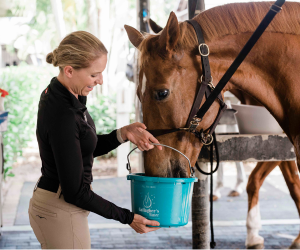Don't Get Banned for Doping: FEI Human Drug Testing Rules Explained

The recent news of three FEI-level eventers testing positive for banned substances has rocked the horse world, leaving many riders with questions: Who is subject to drug testing? When? How? Am I at risk?
Heels Down Magazine spoke with representatives from US Equestrian to clarify the rules for human athletes. Here’s what you need to know.
The Program Basics
The Fédération Equestre Internationale (FEI), the governing body for international-level horse competitions — uses the standards of the World Anti-Doping Agency (WADA) for its Clean Sport for Humans program. The WADA is involved with anti-doping regulations for many sports, so the rules aren’t unique to the horse world. While the sports covered under the WADA standards are quite dissonant, the overall program goal is universal: to protect fair competition as well as athlete health and welfare.
FEI-level athletes are subject to drug testing both during and out of competition.
Who Can Be Tested
FEI rules state that “international-level” athletes — as well as those competing in the Olympics and similar international-level events — are subject to testing. Athletes are considered to be FEI-level/international athletes if they are currently registered with the FEI or if they have competed in an FEI-level competition within the current year.
This means that if FEI-registered riders are at a competition and competing at a non-FEI level, they are still subject to testing. For example, if someone has recently shown at the one-star level of eventing, but is competing a young horse at the Novice level at a particular competition, that rider can be tested both at the horse trial and out of competition as well.
Additionally, the FEI has a Registered Testing Pool that includes those more likely to be tested outside of competition. For those in the United States, that includes any U.S. athlete within the top 10 on the FEI ranking list of his or her discipline. Those in the Registered Testing Pool are notified of their selection into the pool, but they will not be made aware of testing times or locations in advance. The testing pool athletes must submit information regarding their planned travel to make it easier for the testing agencies to find the athletes for out-of-competition drug testing. More information can be found here.
How Riders Are Selected for Testing
The selection process is determined by the testing agency, which can be the FEI, WADA or the United States Anti-Doping Agency (USADA). An athlete will not be notified of testing until they are selected and asked to complete the sample collection process, which is usually via a urine sample. This can occur both in and out of competition, and athletes are typically notified either in person or via telephone.
Note that athletes can be in violation for simply being in possession of or attempting to use a prohibited substance.
What Substances Are Prohibited?
The best way to find out the status of any medication or supplement is to go to www.globaldro.com to search by substance, dosage and administration method. The information found on this site is in line with the WADA Prohibited Substance List, which the FEI Clean Sport program follows. There are some substances that are prohibited at all times, some only during competition, and others for only certain sports.
USEF also recommends that athletes visit the USADA website for more information on testing, regulations, and athlete rights. To read the most up-to-date changes to the prohibited list, go here.
Be sure to check even over-the-counter medications and therapeutic substances that you occasionally or regularly use. Even some over-the-counter allergy and cold medications can land you in trouble during competition. Similarly, medications purchased abroad may not contain the same substances as those purchased in the United States, even if the brand name is the same. Check everything, including nutritional supplements.
Note that athletes can be in violation for simply being in possession of or attempting to use a prohibited substance. Ignorance or lack of intent is not a defense either; if an athlete takes a supplement without realizing that a prohibited substance is an ingredient, that still constitutes a violation of the anti-doping rules.
If an athlete is found to be in violation of anti-doping rules, he may be suspended by the FEI for up to four years.
Therapeutic Use Exemptions
If an athlete must take a prohibited substance for health reasons, as prescribed by a doctor, all hope is not lost — she can apply for a Therapeutic Use Exemption (TUE). If granted, a TUE will allow the athlete to legally take the substance without fear of a doping violation for that substance. Note that even if you have a prescription from your doctor, you must still apply for a TUE; a prescription alone does not prevent you from being in violation of FEI rules.
A TUE application can be found here, and athletes can also contact Steven Morrissey at USEF by emailing [email protected] or calling (859) 225-7686. He can help explain the process and answer any questions. After submitting a completed TUE application to USEF, they will review it and then submit it to the FEI for review and approval.
TUE applications must be submitted to the FEI 30 days prior to participating at an FEI event, so that means that you must start the process well in advance of 30 days to ensure proper documentation and time for USEF review. In an emergency situation, contact Steven Morrissey immediately, and it is possible an expedited TUE application process may be enacted — although it is not guaranteed.
Violation Consequences
If an athlete is found to be in violation of anti-doping rules, he may be suspended by the FEI for up to four years. The details of suspensions are decided on a case-by-case basis.
Of course, there are many specific rules and program details too nuanced to be included in this article, so the USEF urges all athletes to read the full regulations. The rules and full Clean Sport details can be found at https://inside.fei.org/fei/cleansport/humans. Additional information can be found via USEF, the WADA and the USADA.
Download the Heels Down Magazine app in the iTunes AppStore: http://apple.co/1QicprS or Google Play for Android phones and tablets: http://bit.ly/1sXQV75. Subscribe for a year and get two months free!



